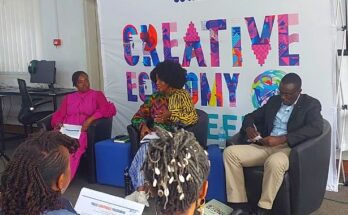Motswedi Modiba a hit on a hit on Chinese reality TV
A fortnight ago, Motswedi Modiba (MOE.) was a promising South African vocalist, garnering attention within her homeland.
Fast forward to today, and she has become a sensation on one of China’s most prominent reality TV shows, captivating millions with her mesmerizing Mandarin performance.
Modiba, notably the first Black and African contender on “Sing! China,” left judges astounded with her rendition of Karen Mok’s ballad “Love.”
The competition, currently in its eighth season, mirrors the format of the US show “The Voice,” featuring the initial round where judges make selections without seeing the contestants.
Out of the four judges, two recognized Modiba’s exceptional talent, propelling her to the next stage.
The pivotal choice of a mentor for the subsequent phases led her to select singer, rapper, and actor Wilber Pan.
Social media in China lit up as Modiba’s name trended. Music blogger Radio Utopia exclaimed to their 11.8 million Weibo followers, “How could Motswedi sing so well?” Meanwhile, the hashtag “I cannot compete with Motswedi” gained traction, referencing a statement from competition judge Joker Xue.
From TikTok Jest to Breakthrough Fame
Modiba’s trajectory to success has been meteoric, but behind the headlines lies a history of diligence and commitment.
Born in Tshwane, South Africa, the 26-year-old shared with CNN that her parents enrolled her in Pretoria Chinese School, where she mastered Mandarin from the age of six to 18.
She explained, “They looked at world trends and saw China was probably going to become an important world player economically, so wanted to give us the best opportunities in life.”
During high school, Modiba participated in the international language competition known as the Chinese Bridge Competition, clinching victory in the national category.
This accomplishment earned her a scholarship to study Chinese language and literature at Yunnan Normal University in Kunming, China.
Her journey in music commenced as a child, contributing to the recording of “Baba Wethu,” a song by South African gospel artist Tebs David.
While pursuing her studies in China, she ventured into small-scale singing contests, performing in Mandarin. In 2022, she launched her career in South Africa as MOE. with the single “It Was A Vibe,” securing a coveted Metro FM Music Award.
Until recently, she pursued a master’s degree in jazz arts at the Manhattan School of Music, New York.
One fateful April night, she jested with friends about creating a viral hit on Douyin (the Chinese version of TikTok) and posted a singing video. “It does go viral,” she recalled. “Then I post another one and it goes viral… within about two weeks, I had over a million views.”
Emails soon flooded her inbox, including one from a producer of “Sing! China.” By June, she was in China, gearing up for her audition.
A Global Aspiration
Modiba’s ambitions transcend geographical boundaries. She aspires to be a household name worldwide, not confined to the Chinese audience.
“I want to become a household name around the world… I am also trying to cultivate audiences back home in South Africa, in Africa, in the US.”
Reflecting on her “Sing! China” audition broadcast on August 11, Modiba described it as a moment of life coming “full circle.”
This performance held special significance, as she had sung the same song years prior at a student competition.
With a much larger audience this time, nerves and adrenaline intertwined, rendering the memory of the performance somewhat hazy.
The next phase entails the “battle” rounds, where participants face off in direct competition. Modiba disclosed that preparations are underway, encompassing aspects like costumes, hair, makeup, and a song choice that remains confidential.
Embracing Identity and Heritage
Modiba’s journey has not been devoid of challenges, particularly in the context of anti-Black racism on Chinese social media platforms.
Nevertheless, her Douyin followers, now exceeding 250,000, have expressed overwhelmingly positive reactions to her audition.
Addressing debates regarding her identity, she asserted, “Yes, I’m in China singing in Mandarin, and I’m speaking in Mandarin, but that doesn’t mean that I am not proud of who I am.”
Modiba remains resolute in preserving her African heritage and celebrating her South African roots. She even hinted at incorporating elements of her heritage into upcoming performances, be it through costumes or verses in Sotho, another language she fluently speaks.
As Modiba’s journey continues to unfold, the anticipation for another vocal masterpiece builds. China’s audience is on the cusp of witnessing what this remarkable South African talent has in store. – CNN
Motswedi Modiba a hit on a hit on Chinese reality TV





